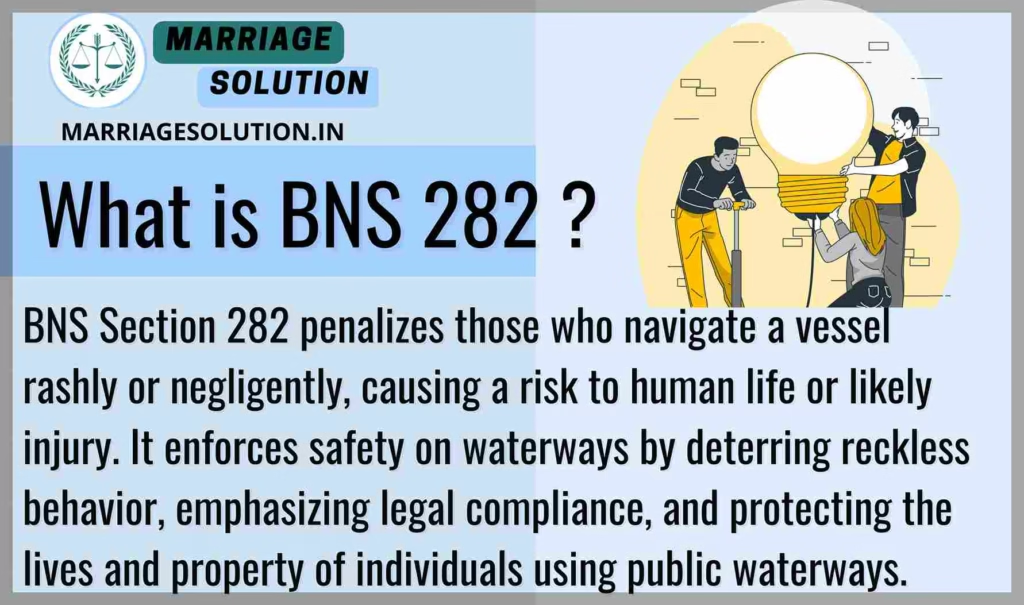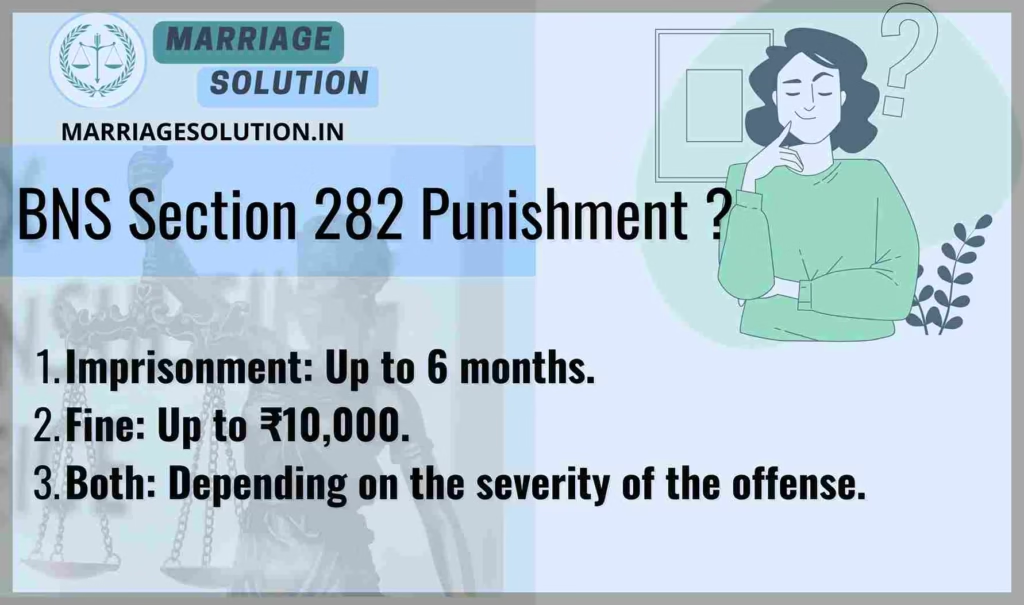Introduction of 282 BNS
Waterways are vital for transportation, trade, and leisure, but reckless operation of vessels can turn them dangerous. BNS Section 282 addresses this by penalizing individuals who rashly or negligently navigate boats, ships, or ferries in a way that endangers human life or property. Replacing IPC Section 280, this law ensures safety on rivers, seas, and lakes by holding vessel operators accountable. By prescribing fines and imprisonment, it promotes responsible navigation and prevents accidents that could otherwise harm passengers, fishermen, or communities living near water bodies.
The Bharatiya Nyaya Sanhita (BNS) Section 282 replaces the old Indian Penal Code (IPC) Section 280.
What is BNS Section 282 ?
BNS Section 282 penalizes those who navigate a vessel rashly or negligently, causing a risk to human life or likely injury. It enforces safety on waterways by deterring reckless behavior, emphasizing legal compliance, and protecting the lives and property of individuals using public waterways.

Under Section 282 of the bns act 2023
Whoever navigates any vessel in a rash or negligent manner so as to endanger human life, or is likely to cause hurt or injury, shall be punished with imprisonment up to six months, a fine up to ₹10,000, or both.
1. Meaning of the Provision
- This section punishes reckless or careless navigation of any vessel.
- “Vessel” includes boats, ships, ferries, and any watercraft used for transport.
- Liability arises when the navigation creates a risk to life or property, even if no actual accident occurs.
2. Scope of the Law
- Applies to all public waterways such as rivers, seas, lakes, canals, and ports.
- Covers both commercial and private vessels — from ferries and cargo ships to leisure boats.
- Ensures accountability for captains, sailors, and operators.
3. Essential Ingredients
To establish guilt under this section, prosecution must prove:
- The accused was navigating a vessel.
- The navigation was rash or negligent.
- The act was likely to endanger human life or cause injury/damage.
4. Examples
- Example 1: A ferry captain speeds through a crowded port, creating waves that overturn smaller boats.
- Example 2: A sailor ignores storm warnings and collides with another vessel due to negligence.
- Not Covered: A sudden accident caused solely by unforeseen natural events (like an unexpected tidal wave) without negligence.
5. Punishment
- Imprisonment: Up to 6 months.
- Fine: Up to ₹10,000.
- Both: In serious cases.
6. Legal Classification
- Bailable: The accused can obtain bail.
- Cognizable: Police can take action without prior approval.
- Non-compoundable: Cannot be settled privately; requires trial.
- Triable by: Any Magistrate.
7. Importance of the Section
- Protects passengers and crew from reckless navigation.
- Encourages compliance with safety norms on waterways.
- Acts as a preventive measure, stopping accidents before they occur.
- Builds public trust in water transport as a safe mode of travel.
Section 282 BNS Overview
BNS Section 282 addresses the offense of navigating a vessel in a reckless or negligent manner that endangers human life or risks causing harm to others. The section ensures accountability for irresponsible behavior on waterways, safeguarding public safety and preventing potential harm.
BNS 282 : 10 Key Points
1. Definition of Rash Navigation
Rash navigation refers to operating a vessel recklessly, without regard for safety protocols or consequences. This includes overspeeding, ignoring navigational rules, or behaving irresponsibly on water. Such actions can endanger passengers, other vessels, and aquatic environments. For instance, a speedboat operator racing through a crowded harbor risks causing severe accidents.
2. Negligent Behavior in Vessel Operation
Negligent behavior involves failing to take reasonable care while operating a vessel, such as not maintaining the boat or ignoring safety equipment requirements. An example would be a captain sailing without checking weather forecasts, leading to avoidable accidents during storms. Such negligence is a punishable offense under this section.
3. Risk to Human Life and Property
The core concern of BNS Section 282 is the risk to human lives and property caused by rash navigation. Actions like disregarding warnings or attempting dangerous maneuvers can lead to injuries, loss of lives, or damage to vessels. For instance, a reckless ferry operator can endanger passengers and harm nearby vessels.
4. Punishment for Rash Navigation
This section prescribes penalties of up to six months of imprisonment, a fine of ₹10,000, or both. These punishments are intended to act as deterrents. For example, if a reckless sailor causes an accident due to rash navigation, they are subject to these legal consequences, ensuring accountability.
5. Classification as Cognizable Offense
A cognizable offense under BNS Section 282 enables authorities to act promptly without requiring prior approval. This allows law enforcement to detain offenders or stop reckless activities on the spot. For instance, if a speedboat operator is caught overspeeding in restricted waters, authorities can immediately intervene.
6. Bailability of the Offense
BNS Section 282 is classified as a bailable offense, meaning the accused can apply for bail. This provision ensures a fair balance between upholding public safety and respecting individual legal rights. For example, a detained boat operator may secure bail while awaiting trial, ensuring due process.
7. Triable by Any Magistrate
Cases under this section are triable by any Magistrate, allowing flexibility in judicial proceedings. This accessibility ensures that cases of rash navigation are handled efficiently without requiring higher courts. For instance, a case of reckless navigation near a port can be tried in the nearest Magistrate’s court.
8. Importance of Legal Compliance
BNS Section 282 emphasizes adherence to navigational laws to protect human life and property. Vessel operators are expected to follow speed limits, safety measures, and other rules. Non-compliance can lead to legal consequences, as seen when captains ignore restricted zone warnings and cause accidents.
9. Impact on Public Safety
The reckless operation of vessels disrupts public safety and trust in waterways as a means of transport. BNS Section 282 serves as a protective measure for passengers and other waterway users. For instance, enforcing penalties for rash navigation ensures safer ferry services and prevents overcrowded vessels from capsizing.
10. Significance of BNS Section 282
This section is critical for maintaining order on waterways, which are essential for transportation and trade. It holds operators accountable and deters risky behavior, fostering a culture of responsibility. An example is reducing accidents in busy ports by penalizing reckless operators, ensuring smoother and safer navigation.
Example 1: Overspeeding Ferry in Crowded Waters
A ferry operator decides to navigate at high speed through a busy river port to save time. In doing so, the ferry creates large waves that destabilize smaller boats nearby, leading to one capsizing and injuring passengers. This reckless action endangers human life and falls under BNS Section 282. The operator is punished with imprisonment of up to six months, a fine of ₹10,000, or both.
Example 2: Negligent Sailor Ignoring Storm Warnings
A sailor, ignoring official weather advisories, sets out to sea during an impending storm. His negligence leads to the boat losing control and colliding with a fishing vessel, causing injuries to fishermen and damage to property. This act of rash navigation is punishable under BNS Section 282, ensuring accountability for endangering human lives and property
BNS 282 Punishment
- Imprisonment: Up to 6 months.
- Fine: Up to ₹10,000.
- Both: Depending on the severity of the offense.

BNS 282 bailable or not ?
Yes, BNS Section 282 is bailable, allowing individuals arrested under this section to apply for bail. This provision balances the safety of the public and the rights of the accused, ensuring a fair legal process.
Comparison Table – BNS 282 vs IPC 280
| Section | What it Means | Punishment / Consequence | Bailable | Cognizable | Trial By |
|---|---|---|---|---|---|
| BNS Section 282 | Deals with rash or negligent navigation of vessels that endangers human life or property. Covers reckless operation of boats, ships, or ferries on public waterways. | Imprisonment up to 6 months, or fine up to ₹10,000, or both. The fine has been increased to enhance deterrence and ensure safety on waterways. | Bailable | Cognizable | Any Magistrate |
| IPC Section 280 (Old) | Penalized rash navigation of vessels that could cause danger to human life or safety. Focused mainly on negligence at sea or on rivers without updated penalty structure. | Imprisonment up to 6 months, or fine, or both. Earlier fines were lower, making the deterrence less effective. | Bailable | Cognizable | Any Magistrate |
| Key Difference: BNS Section 282 replaces IPC Section 280 with higher fines (₹10,000) and refined wording to address modern navigation risks and promote safe and responsible waterway operations. | |||||
BNS Section 282 FAQs
What is the punishment under BNS Section 282?
Rash navigation can lead to imprisonment for up to six months, a fine of ₹10,000, or both, depending on the severity of the offense.
Is BNS Section 282 a bailable offense?
Yes, the offense is bailable, meaning the accused can secure bail after arrest.
Who can try cases under BNS Section 282?
Cases under this section are triable by any Magistrate.
What is the purpose of BNS Section 282?
The section aims to deter reckless navigation, ensuring the safety of passengers, operators, and others using waterways.
Conclusion
BNS Section 282 plays a vital role in ensuring safety on waterways. By penalizing rash or negligent navigation, it protects passengers, nearby communities, and property from avoidable risks. With stronger penalties than the old IPC provision, it sends a clear message that waterways must be used responsibly. This law not only deters reckless operators but also fosters trust in water transport as a safe and reliable system.
Need Legal Support?
If you are dealing with court cases, marriage problems, or any other legal issue, our team at Marriage Solution – Lawyer Help is here for you. Simply fill out our quick online enquiry form, and we’ll connect you with the right legal expert to support your needs.
Finished with BNS 282 ? Continue exploring the next provisions of the Bharatiya Nyaya Sanhita (BNS), 2023. Each section includes explanations, examples, and plain-language breakdowns for easy understanding.
- 283 BNS : Exhibition of false light, mark or buoy.
- https://marriagesolution.in/bns_section/283-bns/
- 284 BNS : Conveying person by water for hire in unsafe or overloaded vessel.
- https://marriagesolution.in/bns_section/284-bns/
- 285 BNS : Danger or obstruction in public way or line of navigation.
- https://marriagesolution.in/bns_section/285-bns/
- 286 BNS : Negligent conduct with respect to poisonous substance.
- https://marriagesolution.in/bns_section/286-bns/
- 287 BNS : Negligent conduct with respect to fire or combustible matter.
- https://marriagesolution.in/bns_section/287-bns/
Full IPC Section List: https://marriagesolution.in/ipc-section-list
All Indian Law & Blogs: https://marriagesolution.in/indian-law/
Full BNSS Section List: https://marriagesolution.in/bnss_section-list
